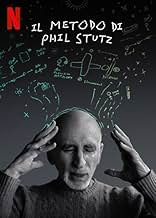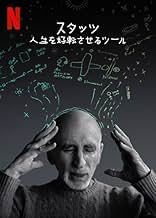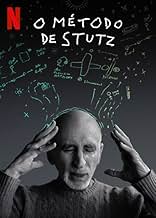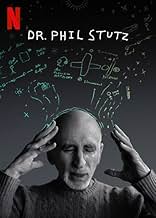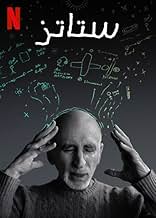IMDb-BEWERTUNG
7,7/10
18.722
IHRE BEWERTUNG
Der führende Psychiater Phil Stutz spricht mit dem Schauspieler Jonah Hill offen über seine frühen Kindheitserfahrungen und seine einzigartige Form der Psychotherapie.Der führende Psychiater Phil Stutz spricht mit dem Schauspieler Jonah Hill offen über seine frühen Kindheitserfahrungen und seine einzigartige Form der Psychotherapie.Der führende Psychiater Phil Stutz spricht mit dem Schauspieler Jonah Hill offen über seine frühen Kindheitserfahrungen und seine einzigartige Form der Psychotherapie.
- Regie
- Hauptbesetzung
Zusammenfassung
Reviewers say 'Stutz' is a profound documentary delving into Jonah Hill's therapeutic journey with Phil Stutz, emphasizing mental health and vulnerability. It underscores the significance of open dialogue, self-acceptance, and practical therapeutic methods. Audiences value its raw honesty, valuable insights, and emotional resonance. While some critics point out pacing inconsistencies and moments of detachment, 'Stutz' is widely praised for its authentic take on mental health and its capacity to motivate viewers towards positive transformation.
Empfohlene Bewertungen
I don't go to therapy. But this was kind of like going to a therapist. I paused it at several points to think about my answers (for instance my shadow). It made me think a lot about things I haven't let myself focus on and it was helpful to address those things internally and this gave me an outlet to do that. I appreciate the honesty shown by both Jonah and his therapist. Great job, great film. So rare to see truth captured like this I was really surprised how much I enjoyed it. Even if therapy isn't your thing I recommend giving this a shot I think it would surprise even the biggest cynic. The tools given are really life changing again I'm super grateful this was made.
Dr. Stutz's eclecticism is what makes him a formidable therapist. He was schooled in psychoanalytic theory, but has blended cognitive behavioral therapy, mindfulness and acceptance into a simple yet potent formula to follow.
Step 1: Identify your Part X, a.k.a. Your inner saboteur. These are all the negative messages about yourself from society, community and family that you have internalised. They form barricades that prevent you from reaching your goals and attaining self-actualisaton.
Step 2: Befriend your Shadow. Most people try to run away from their shadow yet the shadow is irrevocably a part of them. It is the side of you that you are the most ashamed of and the reason you are ashamed of it is Part X, the negative messaging. Be compassionate to the shadow by refuting Part X and loving all parts of yourself.
Step 3: Beware the Snapshot. The snapshot is the thing that we think will finally bring us happiness once we have achieved it, and make up for past hurts and disappointments. Hill thought it was fame and success for him but soon plunged into depression when he realised that it did not make his shadow go away. The snapshot is a diversion.
Step 4: Get out of the Maze. This is us holding onto old grievances, demanding that life should be fair when it is not. It keeps us stuck in the past, unable to enjoy life in the present, and contaminates the future. To get out of the Maze, Stutz advocates for Active Love.
Step 5: Exercise Active Love. Embody the love that you wish to receive from the universe and project it onto those who have done you wrong so that you may forgive them for their actions. This is exercising kindness for yourself and empathy for those who have been responsible for your Part X, finally allowing yourself to let go and move on.
Step 6: Use Radical Acceptance. Try not to resist your negative thoughts and feelings. Whatever happens when you get told not to think about a pink elephant? Instead acknowledge the pink elephant, tell it kindly that you will not engage with it and turn your attention to something more productive and rewarding.
Step 7: Practice the Grateful Flow. Surmount Part X by reminding yourself the things that you are grateful for in life, no matter how big or small. This is like a mindfulness practice in that it helps us to ground ourselves and not be carried away by the incessant negative messages from the world.
Stutz says that his biggest fear is not getting enough done before he dies. He has a website offering The Tools, but there is probably an opportunity for a book like the Happiness Trap, which takes people through the steps of Acceptance and Commitment Therapy (ACT).
Step 1: Identify your Part X, a.k.a. Your inner saboteur. These are all the negative messages about yourself from society, community and family that you have internalised. They form barricades that prevent you from reaching your goals and attaining self-actualisaton.
Step 2: Befriend your Shadow. Most people try to run away from their shadow yet the shadow is irrevocably a part of them. It is the side of you that you are the most ashamed of and the reason you are ashamed of it is Part X, the negative messaging. Be compassionate to the shadow by refuting Part X and loving all parts of yourself.
Step 3: Beware the Snapshot. The snapshot is the thing that we think will finally bring us happiness once we have achieved it, and make up for past hurts and disappointments. Hill thought it was fame and success for him but soon plunged into depression when he realised that it did not make his shadow go away. The snapshot is a diversion.
Step 4: Get out of the Maze. This is us holding onto old grievances, demanding that life should be fair when it is not. It keeps us stuck in the past, unable to enjoy life in the present, and contaminates the future. To get out of the Maze, Stutz advocates for Active Love.
Step 5: Exercise Active Love. Embody the love that you wish to receive from the universe and project it onto those who have done you wrong so that you may forgive them for their actions. This is exercising kindness for yourself and empathy for those who have been responsible for your Part X, finally allowing yourself to let go and move on.
Step 6: Use Radical Acceptance. Try not to resist your negative thoughts and feelings. Whatever happens when you get told not to think about a pink elephant? Instead acknowledge the pink elephant, tell it kindly that you will not engage with it and turn your attention to something more productive and rewarding.
Step 7: Practice the Grateful Flow. Surmount Part X by reminding yourself the things that you are grateful for in life, no matter how big or small. This is like a mindfulness practice in that it helps us to ground ourselves and not be carried away by the incessant negative messages from the world.
Stutz says that his biggest fear is not getting enough done before he dies. He has a website offering The Tools, but there is probably an opportunity for a book like the Happiness Trap, which takes people through the steps of Acceptance and Commitment Therapy (ACT).
I have struggled immensely with my mental health over the past 12 years and on a lesser scale the other 29 years of my life. I have had countless therapy sessions, more often than not with one of the sit there and listen, but don't contribute therapists Jonah and Phill discuss near the start of the movie and whilst they were great at allowing me to vent, the only therapists that truly made an impact on me, were the ones who would have an actual conversation with me, call me on my issues and help me explore ways I can improve my life.
Stutz is the perfect example of this method of therapy and I am so grateful for this movie and the wisdom it imparts on us.
Whilst the cinematography, editing and pacing of the movie are all great, what makes Stutz truly remarkable is the vulnerability and truthfulness found within Jonah and Phill's relationship. You can really feel the openness, love and respect between these two people, which allows us as the viewer to be honest with our own answers to the questions posited throughout.
I doubt either of them will ever see this comment, but to Jonah and Phill, if you do see this, I just want to say, thank you. I related to so many of the stories and thoughts that you both shared and even found myself crying when responding to some of the questions you asked. I hope that this reaches as many people as possible and that people gain as much from it as I have.
Stutz is the perfect example of this method of therapy and I am so grateful for this movie and the wisdom it imparts on us.
Whilst the cinematography, editing and pacing of the movie are all great, what makes Stutz truly remarkable is the vulnerability and truthfulness found within Jonah and Phill's relationship. You can really feel the openness, love and respect between these two people, which allows us as the viewer to be honest with our own answers to the questions posited throughout.
I doubt either of them will ever see this comment, but to Jonah and Phill, if you do see this, I just want to say, thank you. I related to so many of the stories and thoughts that you both shared and even found myself crying when responding to some of the questions you asked. I hope that this reaches as many people as possible and that people gain as much from it as I have.
You just have to see this film. No way around it. Just have to. It is just great to be able to see something so simple, short, but yet so effective on your mind - or better yet, your emotional health.
It is so important that we understand the magnitude of the impact our emotions have on us, how they control us if we don't control them - and it all starts with acknowledging them, so this film will help you do just that!
Presenting therapy as something normal, presenting humans as emotional beings - which we really are - will help people allow themselves to be just that, no matter the sex or the age.
The 'tools' presented are also very useful. Thank you for this movie!
It is so important that we understand the magnitude of the impact our emotions have on us, how they control us if we don't control them - and it all starts with acknowledging them, so this film will help you do just that!
Presenting therapy as something normal, presenting humans as emotional beings - which we really are - will help people allow themselves to be just that, no matter the sex or the age.
The 'tools' presented are also very useful. Thank you for this movie!
10zywickih
I recommend everyone watch this movie. I respect Jonah Hill so much for making this, especially in todays climate, and also for being a MALE raising awareness on the tremendous help and importance that therapy provides. There are so few resources available to people who need mental health support, and many of those resources available are crazy expensive or therapists are booked solid with clients. This film is for everyone. We all struggle sometimes. This made me cry, laugh, and take notes. I will go back to this movie every time I feel the need for a therapy session. It also reminded me of my relationship with my counselor that I went to for ten years. Bless Jonah and Stutz. What a gift of a film.
Wusstest du schon
- WissenswertesPhil Stutz wrote a book called The Tools published in 2013 explaining how to apply the techniques Jonah highlights in the film.
- Zitate
Phil Stutz: You don't get to the world of meaning through big things. You get it through small things.
- VerbindungenReferenced in Film Junk Podcast: Episode 873: Terrifier 2 (2022)
Top-Auswahl
Melde dich zum Bewerten an und greife auf die Watchlist für personalisierte Empfehlungen zu.
- How long is Stutz?Powered by Alexa
Details
- Laufzeit
- 1 Std. 36 Min.(96 min)
- Farbe
- Sound-Mix
- Seitenverhältnis
- 1.78 : 1
Zu dieser Seite beitragen
Bearbeitung vorschlagen oder fehlenden Inhalt hinzufügen



